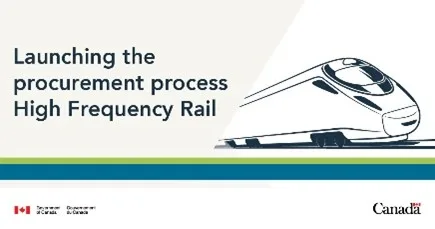Ottawa – The development of the High-Speed Rail (HSR) initiative in the Toronto to Québec City Corridor is Canada’s largest infrastructure project in over a generation. Due to the complexity of this initiative and to maximize value to taxpayers, Transport Canada and Public Services Procurement Canada conducted an innovative procurement process to:
- attract consortia with world-class expertise in designing, implementing and operating passenger railway services;
- obtain innovative ideas from bidders, considering the cost-benefit trade-offs of alternatives for meeting or exceeding the project outcomes, that will be leveraged during the Co-Development Phase; and
- select a highly competent Private Developer Partner to co-develop and ultimately deliver the initiative.
Procurement process
To select the Private Developer Partner, a market engagement and a two-phase procurement process were undertaken by the Government of Canada:
- A Request for Expressions of Interest (RFEOI) was issued in March 2022 to inform and mobilize the industry, and to seek feedback on the planned approaches to procurement and project development.
- A Request for Qualifications (RFQ) was issued in February 2023 to prequalify up to three bidder teams to participate in the subsequent phase.
- A Request for Proposals (RFP) was launched in October 2023 and closed in July 2024 as planned, leading to the selection of a preferred bidder for the initiative.
- Identification of the Preferred Bidder was in February 2025. The bidder will collaborate with the Crown corporation responsible for Alto to finalize and sign the Pre-Development Agreement, subject to approvals, to enter the Co-Development Phase.
Request for expressions of interest (RFEOI)
The RFEOI, issued in March 2022, provided the opportunity to position the procurement for success in delivering the best results for Canadians by sharing key information early with industry. There was a high level of interest in the project from both domestic and international parties, with formal responses from a total of 54 interested parties. Responses confirmed support for the overall approach, sought clarifications on some elements of the project, and suggested ways to enhance the design of the procurement process.
Based on market feedback, Canada made strategic adjustments to its procurement process. This step also provided prospective candidates with adequate time to form bidding consortia.
Request for qualifications (RFQ)
On February 17, 2023, Canada launched the RFQ to identify and qualify up to three respondents. This RFQ closed in April 2023.
On July 20, 2023, the Government of Canada announced the three groups selected to be bidders in the Request for Proposals.
Request for proposals (RFP)
On October 13, 2023, the Government of Canada launched the RFP to select the best private Developer partner to deliver the initiative. To maximize public benefits and innovation, each bidder developed two concepts with respect to speed:
- one that calls for trains that can reach a maximum speed of 200km/h to meet or marginally exceed the project outcomes, and
- one that includes speeds above 250km/h, capable of significantly exceeding project outcomes.
As part of the RFP process, Canada secured the broad licensing rights to intellectual property in the proposals developed. This enabled elements of any proposals, including innovative ideas from bidders, to be integrated into the final design, maximizing value to Canadians by incorporating the best solutions available.
The RFP period leveraged thorough and continuous engagement between Canada and bidders. This engagement included more than 80 commercially confidential meetings, subject specific meetings and progress updates with bidders. Each bidder also participated in introductory meetings with potentially impacted Indigenous communities and organizations. Bidders were required to provide interim submissions during the RFP period for review by the Government of Canada, including elements of their technical solutions. These meetings and submittals provided visibility on the progress of bidders and opportunities to validate assumptions, adjust their approaches and enable further improvement to their concepts, the whole in accordance with the project outcomes.
Bidders were subject to a comprehensive security assessment including a Foreign Ownership Control or Influence evaluation. In addition, the Private Developer Partner will be required to maintain appropriate security clearances issued by the Government of Canada.
The three bidding groups that submitted their proposals on July 24, 2024, included the following companies:
- Cadence – CDPQ Infra, Air Canada, Atkins-Réalis, Systra Canada, Keolis Canada, SNCF Voyageurs.
- Intercity Rail Developers – Meridiam, Kilmer Transportation, Intercity Development Partners, DF Canada Infrastructure Group Inc, Jacobs, Hatch, CIMA+, RATP Dev Canada, First Rail Holdings, Renfe Operadora.
- Partenaires Ferroviaires QCONNEXION Rail Partners – Fengate, John Laing, Bechtel, WSP, Deutsche Bahn.
Proposals were evaluated based on their ability to deliver the initiative with the best benefits for Canadians. The following criteria were considered:
- how well the concepts met or exceeded desired project outcomes,
- the quality and comprehensiveness of plans and approaches for the Co-Development and Execution phases,
- Indigenous participation in the project,
- the readiness and capacity of bidders to become the Private Developer Partner, and
- demonstration of value for money and cost effectiveness.
Following the evaluation of the three high quality proposals, Cadence achieved the highest score and was identified as the Preferred Bidder. Cadence will now work with the crown corporation responsible for Alto to finalize and, subject to approvals, enter into the Pre-Development Agreement.
Fairness monitor
To oversee the procurement process, an independent Fairness Monitor was appointed by Public Services and Procurement Canada, acting as an objective third-party observer to ensure fairness and consistency. The Fairness Monitor oversaw the entire procurement process, with particular attention to engagements with bidders and evaluation processes. According to the Fairness Monitor:
“In our professional opinion, the competitive selection process that we observed and monitored was conducted with exemplary professionalism, dedication, and meticulousness by the project team. Their thorough and methodical approach ensured flawless compliance with the criteria of fairness, openness, and transparency, demonstrating their exceptional commitment to maintaining the highest standards.” – BDO Canada LLP.
Once complete, the Fairness Monitor’s report will be publicly available.









